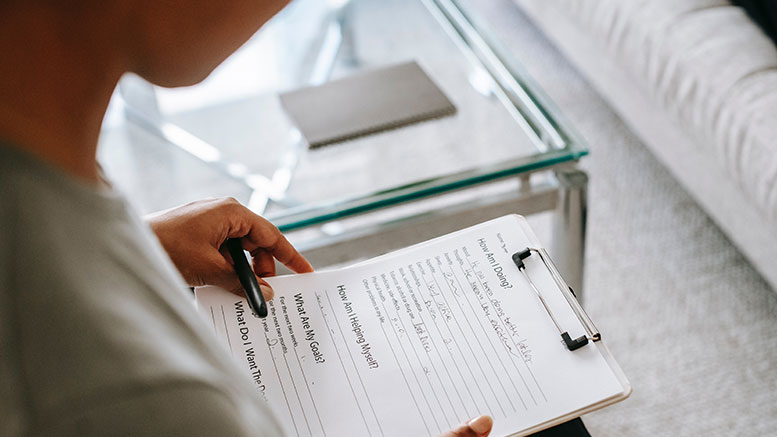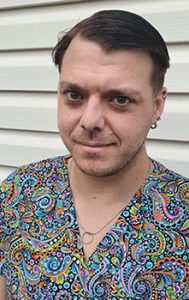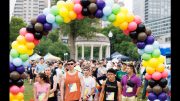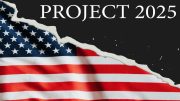LGBTQI+ Stroke Victims & Partners’ Research Seeks Transgender Patients as Well, To Interview for the Study; Part II of Kokay’s Project Came Out on Pride Month; It can be read below.
By: Chris Gilmore/TRT Reporter—
A Ph. D. candidate at the University of Sydney is recruiting respondents for an international study that is exploring the impact of stroke on sexuality in LGBTQI+ stroke survivors and their partners. Although based out of Australia, the study also seeks to recruit Americans who meet the criteria for it.
A full-time hospital Social Worker, William Kokay (He/Him), specializes in rehabilitation and most of his clients have suffered a stroke. Through working with stroke survivors, Kokay has found that resources and rehabilitation approaches are heteronormative in nature and often leave people who are LGBTIQ+ and their partners particularly vulnerable, thus needing to educate themselves on sexual issues they may face.
“Sexuality is integral to wellbeing and confidence, and yet there is currently no research on how stroke impacts members of the LGBTIQ+ community,” Kokay explained via e-mail. “My research aims to explore how sexuality is experienced by LGBTQI+ persons and their partners following [a] stroke. This information is critical in order to develop best practice interventions to support sexual health and well-being among this population.”
Many organizations dedicated to stroke victims do not collect data about sexual orientation, said Kokay, which makes it particularly hard to find CVA (cerebral vascular accidents aka strokes) survivors. In addition, members of the LGBTQI+ community may have trust issues due to bias; often receive inferior treatment from health service providers, and experience stigma related to sexual orientation and gender identity. That is why Kokay is vested in the study.
“My hope is that this research can amplify the voices of LGBTQI+ stroke survivors and bring an important perspective to a health issue in the LGBTQI+ community that is currently not addressed,” he conveyed to The Rainbow Times. “This will also lead to the future development of inclusive sexual rehabilitation resources for stroke survivors and their partners.”
But a sexuality post-stroke paper from Dr. Margaret McGrath, Dr. Emma Power, Sandra Lever and Annie McCluskey called his attention and he contacted Dr. McGrath about his thoughts of an LGBTQI+ post-stroke research.
“A few e-mails and phone calls between Dr. McGrath and myself led me to my post-graduate research studies at the University of Sydney with the support of Dr. McGrath to study this field and to close the gaps that currently exist in the research in the hopes of developing more inclusive rehabilitation resources for this population,” said Kokay of how the study started.
The study is looking for participants in the United States (and other countries) that meet the criteria as either LGBTQI+ stroke victims or the partner of a stroke victim from the community. However, the respondents must be English-speaking and although Kokay wishes to reach a wide audience, they have not partnered yet with an American medical institution. The Rainbow Times interviewed Kokay at length to better understand the project and the criteria for recruiting potential respondents. The first part of the interview can be found online (due to space constraints). The second part will be published in the June (Pride) issue of this publication.
The Rainbow Times: What made you want to work on this study?
William Kokay: With working with stroke patients in rehabilitation I have had the opportunity to work with a few that identify as LGBTQI+. It was when I tried to locate resources that were less heteronormative than the current mainstream resources, I provide to stroke patients and I could not find anything anywhere.
What I found [were] some articles on how a man reported once that he had a stroke that changed his sexuality and [others] discussing the [potential] medical issues that transgender people may face. None of this was helpful to me and also painted the community in a heteronormative light, which I found very silencing as a gay man.
It wasn’t until I came across a sexuality post-stroke paper from Dr. McGrath, Dr. Power, Lever, and McCluskey [that] got me interested to reach out [to them] and ask about LGBTQI+ post-stroke research. A few e-mails and phone calls between Dr. McGrath and myself led me to my post-graduate research studies at the University of Sydney with the support of Dr. McGrath to study this field and to close the gaps that currently exist in the research in the hopes of developing more inclusive rehabilitation resources for this population.
Q: When did you start the study? How long did it take you from its origin to having it be approved by the Human Research Ethics Committee at the University of Sydney [2021/719]?
A: I started my degree in October of 2019, which was me and my supervisors’ first work on a systematic review of the current research … It was early to mid-2021 that we started the process of applying for ethics [review] with the Human Research Ethics Committee at the University of Sydney. We received approval in December of 2021, which is when we started recruitment for this current study.
Q: Why are partners of stroke victims also considered participants?
A: Partners are being considered because stroke doesn’t just impact the person who has had the stroke. It also can have a significant impact – both positive and negative – on partners and other close family members. Unfortunately, partners are not always included in the research, but in order for us to be able to provide appropriate support for partners, we need to learn about how stroke impacts them also.
Q: In your line of work, you’ve had many stroke survivors who are members of the LGBTQIA+ community, that you state are “particularly vulnerable.” Can you explain the vulnerability you’re referring to?
A: From my experience, the vulnerabilities that are caused by the current stroke resources available can have many different impacts on the LGBTQI+ community. These can start with the fact that very few studies of stroke specifically include people who are LGBTQI+ and among studies addressing sexuality post-stroke. For example, a recent scientific statement from the American Heart Association, AHA, points to the lack of knowledge that generally exists about cardiovascular health and risk factors among people who are LGBTQI+.
… While there is some information about sexuality after stroke for heterosexual persons, most resources don’t include information or support that is LGBTQI+ inclusive and my experience tells me this is important because existing groups (which mostly cater to heterosexual people) may not be appropriate due to previous trauma with this population. If we were to look at more specific issues, with the current resources [available], it also does not identify or provide knowledge on issues that intersex or transgender persons may experience due to transitioning, gender identity, medical issues, or biology. It is not only the resources that have this issue but also the lack of knowledge and understanding that health professionals hold with recent studies highlighting that health professionals often feel uncomfortable or have a lack of understanding in relation to the issues that impact LGBTQI+ persons or hold views that cause them to discriminate against this population.
Q: When you wrote to us about the “need to educate themselves on sexual issues they may face,” what do you mean by it? Is it the partners or family of the LGBTQIA+ person who’s suffered the stroke? Or is it that medical professionals should educate themselves on how to deal with LGBTQIA+ people who’ve suffered a stroke?
A: The need to educate themselves on sexual issues they may face was in relation to the need for health professionals to have the knowledge and the confidence to educate LGBTQI+ stroke survivors, their partners, and their families (biological and chosen) on the sexual issues that the stroke survivor and their partner may face post-stroke. The reasons for this are that sexuality is connected to well-being and persons within the LGBTQI+ community hold sexuality as an area of importance to their identity and their well-being.
Without being provided [with] the proper education they could be faced with many unforeseen issues and consequences and not have the education or the support to work through this. Stroke is a condition that can affect anyone, it is not the aging disease many think it is and it can impact many, many lives even if they have experienced a stroke themselves. This is why I strongly feel that stroke and the impacts of stroke should be something we start to have a conversation about not just around the impact and the need to improve rehabilitation strategies but also to educate people about the signs and the prevention of stroke because one day they may just need to act FAST (Face, Arms, Speech, Time to call for an ambulance).
Q: You state that having a study like this one is “critical in order to develop best practice interventions to support sexual health and wellbeing among this population.” What do you say to naysayers who assert they are treating the condition and do not need to know a person’s deep and intimate details to do so?
A: I would say to actually understand one’s experience with anything, you need to be willing to have a conversation. In present times, we are all too busy to stop and talk with each other about who [we are as people]. Each and every person will have individual experiences and issues and there is no one way to work with a patient or a client.
There is a term called “person-centred care,” which I use daily within how I work with patients and their families, and I do that by having conversations with them, multiple conversations. These conversations are sometimes about their grief, about their stroke, and sometimes it is about those intimate moments that they may feel uncomfortable discussing. By providing them with a safe and non-judgmental environment, I am able to provide them with the space to [inform] me about who they are as people so I can design my approach to how I work with them in order to get the best results for the patient.
Now, for the naysayers that feel they don’t need to know a person’s intimate and private details, I would say yes you are treating a condition, but as we know not all persons react the same way to the same condition. We need health professionals to learn how to have these so-called uncomfortable conversations.
Q: If the number of respondents is vastly Australian and British, but not as many American, will the results be skewed as each country’s perspective of members of the LGBTQIA+ community and how to treat them medically varies based on geographical location and cultural norms? Can you apply the general results of the main populations to other countries that may not have as many participants?
A: This is a good point and you’re right – we know that experiences of stroke, experiences of rehabilitation, and experiences of sexuality will vary by country. But we also know that in each of these countries there are clinical guidelines, which provide recommendations for the provision of stroke rehabilitation based on the best available evidence. These guidelines all make recommendations that stroke survivors should have the opportunity to receive information and ask questions about sexuality – regardless of sexual orientation. We also know from previous research that stroke rehabilitation professionals in all of these countries often fail to address sexuality – in fact, earlier research shows us only 23% of professionals ever ask questions about sexuality. So, while there will naturally be variations in people’s experiences, we anticipate that the findings will be relevant in other contexts.
Q: Is the study seeking participants who come from all races, ethnicities, backgrounds, etc.?
A: We are open to participants from different backgrounds; however, they must identify as LGBTQI+ and have experienced a stroke or be the partner of a stroke survivor, reside within the USA, UK, Canada, New Zealand, or Australia and speak English.
Q: Will the study be conducted in one or more languages?
A: All participants will have to be fluent in English, as our research team does not speak any other languages. However, people with aphasia or other communication impairments are encouraged to participate as we have a speech pathologist on the research team who can assist with these interviews.
Q: Are you partnering with other clinics, hospitals, etc. in the United States for the study? If yes, who are your U.S. partners? If not, why did you decide not to partner with medical institutions for it?
A: This has been spoken amongst the research team and due to there being no existing data on this topic we decided to approach any organisation that identifies as LGBTQI+ or related to stroke to try to recruit first, and not actively partnering with any one organization.
Q: When you say that you hope the research can amplify the voices of LGBTQI+ stroke survivors in a medical setting, what do you specifically mean by it?
A: Because the LGBTQI+ community can have different experiences, approaches, and meanings to health care, we need to be able to understand their experiences of stroke and its impact to be able to develop more inclusive materials that touches on this subject. For example, you may give someone who identifies as a man a flyer on erectile dysfunction, but the flyer would not necessarily be appropriate for someone who identifies as a transgender man and will not provide the knowledge they need around sexual issues pertaining to sexual activity. So, as you see here the use of mainstream materials is not always going to be appropriate or suitable.
Recent research has found this to be an issue with many members of the LGBTQI+ community [who are] left struggling to understand issues around the impact on sexuality in a range of different conditions. So, by amplifying the voices of LGBTQI+ stroke survivors we will have a better understanding of how sexuality is impacted to better explore what aspects need to be considered for the development of inclusive sexual rehabilitation resources.
UPDATED: This exclusive TRT story appeared in the June (Pride) 2022 issue of this publication. You can read the rest of it below.
—
Q: Why the impact of stroke on sexuality in LGBTQI+ stroke survivors? What about this community made you focus on it?
A: I have worked with stroke survivors for over 5 years now and I have learned so much from them. In working with stroke survivors that have identified as LGBTQI+, I have found them wanting education, knowledge, and resources about how this will impact their identity and their sexuality. This has become my passion to advocate for this community and to fill the large gaps within the health and research field so that we can provide better holistic and inclusive patient-centered care to this population.
Q: As you know, often members of this community are skeptical when sharing their lives with strangers. How can potential responders feel at ease with this study? What can you tell them about it and why can they trust you?
A: Talking about a subject such as sex and sexuality is a very personal topic for many people and that is further complicated when something like experiencing a stroke is included. I am a trained Social Worker who identifies as a gay male and have worked in this field for over 5 years. My approach with this population is to be open-minded to all experiences and views of this community.
My interviews are conducted in a private space away from other persons and their information remains confidential for only the research team to access. If potential participants have questions or inquiries, I welcome them to contact me, and if they wish I could give them a call to talk about the study further with them via zoom or phone so they can feel more comfortable before deciding whether to pursue an interview. My aim in this research is to support this community and to provide understanding and not judgment, which I feel goes a long way when discussing sensitive and difficult things with a stranger.
Q: Will their name, etc., be posted or kept somewhere? Or, is this an anonymous study? How is respondents’ confidential information kept safe? What assurance do you give people reading this story about that?
A: Participant names and identifying details will remain confidential and will be stored electronically within the University of Sydney secure database for access only to the research team. This information is outlined within the participant information sheets, which are available from the study website, it’s listed on the study posters and can be accessed via the QR code. Some details such as geographical location, age, gender, pronouns, [and] sexual orientation may be identified within the written results that are expected to be published. However, any details that will identify participants will be removed, names will be changed, and will not be used within the results or the data.
Q: How does this relate to the transgender and the nonbinary communities, which have vastly different circumstances in and of themselves (gender identity, etc.)?
A: The research team has made all attempts to make the questions posed within the interview standard so that participants will be able to provide their experiences in relation to how they identified. With current research, the transgender and nonbinary communities are heavily underrepresented or are not represented at all. We wish to change this and be inclusive in these communities. If we are able to recruit members of this community and have sufficient data, we may explore a separate paper to publish these individual findings in order to provide clear and inclusive voices of this community.
Q: Do potential participants contact you about the study? Or, do you contact them, etc.?
A: Participants will contact me and express interest. Once they make contact this will be considered as consent to respond to them appropriately.
Q: What is the website, QR Code, e-mail, and phone number that potential participants should use if they wanted to be a part of the study?
A: These details are all on the promotional poster. Some may wish to call, and some may wish to e-mail. This is up to the individual.
Q: What are the pros of participating in the study (other than helping with your research)? For instance, are there monetary incentives for patients?
A: There are no monetary incentives involved with this study, but it does help to share their experiences to allow for more understanding to be gained on this topic.
Q: How long will the study last? How long does the participants’ part in the study last?
A: For the participant, it is just an interview via zoom. We are looking to conclude recruitment around June/July this year to allow time to analyse the data and write up our findings.
Kokay also let us know that the study “is open to people who are (i) Aged 18 years and older (ii) living in Australia, New Zealand, USA, Canada or United Kingdom (iii) identify as lesbian, gay, bisexual, transgender, queer / questioning or intersex (iv) have experienced a stroke or are a partner of a person who has experienced a stroke.”
Participation involves an interview with Kokay. More information can be found at www.tinyurl.com/LGBTQI-stroke-study. Anyone interested in the study can contact Kokay by telephone or e-mail (+61 2 8627 7766; William.kokay@sydney.edu.au). Or, you can follow the research on Facebook or Instagram at @strokelgbtiresearch. The study has been approved by the Human Research Ethics Committee at the University of Sydney [2021/719].
[This story was initially posted in the April 2022 issue of The Rainbow Times].








